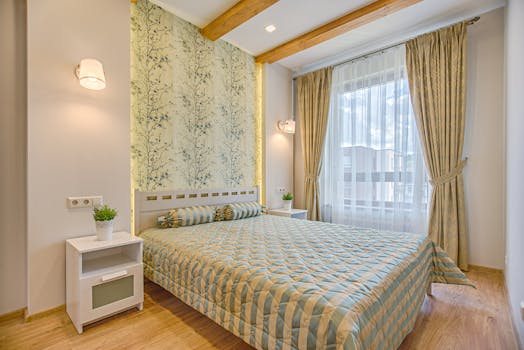You love your sleep. You know that getting enough quality sleep is essential for your health, well-being, and productivity. But you also wonder if you are sleeping in the best possible way. How do you choose between sleeping with curtains open or closed? Which one is better for your sleep quality and quantity? In this blog post, we will explore the pros and cons of sleeping with curtains open or closed to help you decide which one is better for your sleep.
Sleeping with curtains open: What are the benefits?
Sleeping with curtains open is a personal preference and depends on individual factors, sleep conditions, and the environment. Some people may find it comfortable to sleep with curtains open as it allows natural light to enter the room and creates a calming ambiance. Natural light also has some benefits, including:
- Regulating circadian rhythms: Natural light can help to regulate our circadian rhythms, which are our internal biological clocks that tell us when to sleep and when to wake up. Exposure to natural light in the morning can help us feel more alert and energized, while exposure to natural light in the evening can help us feel more relaxed and sleepy.
- Reducing stress levels: Natural light can also help to reduce stress levels and improve our mood by stimulating the production of serotonin, a neurotransmitter that regulates our emotions, appetite, and sleep. Serotonin can also help to prevent or alleviate depression, anxiety, and seasonal affective disorder (SAD)
- Improving sleep quality: Natural light can also help to improve our sleep quality by increasing the production of melatonin, a hormone that regulates our sleep-wake cycle. Melatonin can help us fall asleep faster, stay asleep longer, and wake up more refreshed.

Sleeping with curtains open: What are the drawbacks?
Sleeping with curtains open may not be suitable for everyone or every situation. Some people may find it uncomfortable or disruptive to sleep with curtains open as it may expose them to unwanted light, noise, or privacy issues. Some drawbacks of sleeping with curtains open include:
- Light pollution: Light pollution is the excessive or inappropriate use of artificial light that interferes with natural darkness. Light pollution can come from sources such as streetlights, billboards, cars, or neighbors’ windows. Light pollution can disrupt our circadian rhythms and suppress our melatonin production, which can lead to insomnia, poor sleep quality, and health problems.
- Noise pollution: Noise pollution is the excessive or harmful sound that disturbs our peace and comfort. Noise pollution can come from sources such as traffic, construction, animals, or people. Noise pollution can interfere with our sleep by making it harder to fall asleep, causing frequent awakenings, or reducing our deep sleep stages.
- Privacy concerns: Privacy concerns are the feelings of being watched or exposed by others without our consent. Privacy concerns can come from sources such as passersby, neighbors, or intruders. Privacy concerns can affect our sleep by making us feel anxious, vulnerable, or unsafe.
Sleeping with curtains open: How to do it right?
If you decide to sleep with curtains open, there are some tips and tricks that can help you do it right and maximize your sleep quality and quantity. Here are some suggestions:
- Choose the right curtains: If you want to sleep with curtains open but still enjoy some level of light control and privacy, you can choose curtains that are sheer or semi-sheer. These curtains can filter some light and create a soft glow in your room without blocking it completely. They can also provide some privacy by obscuring the view from outside without making you feel isolated.
- Use additional window treatments: If you want to sleep with curtains open but still have the option of blocking out light or noise when needed, you can use additional window treatments such as blinds, shades, or shutters. These window treatments can be adjusted to suit your needs and preferences depending on the time of day or night. You can also use blackout liners or drapes that can be attached to your curtains for extra light-blocking ability.
- Adjust your sleeping position: If you want to sleep with curtains open but still avoid direct exposure to light or noise sources, you can adjust your sleeping position to face away from the window or use a pillow or an eye mask to cover your eyes. You can also use earplugs or a white noise machine to block out or mask any unwanted noise.

Wrap Up
Sleeping with curtains open is a matter of personal choice and depends on various factors, such as your sleep habits, preferences, and environment. Sleeping with curtains open can have some benefits, such as regulating circadian rhythms, reducing stress levels, and improving sleep quality. However, sleeping with curtains open can also have some drawbacks, such as light pollution, noise pollution, and privacy concerns. If you want to sleep with curtains open, you can follow some tips and tricks to do it right and optimize your sleep experience.
Dale is the colorful mind behind HuetifulHomes.com, where he shows you how to create a home that is as fun and fabulous as you are. He has a passion for color and a knack for DIY, with years of interior design experience he shares his tips and tricks on how to create a home that reflects your personality and style. He believes that color is the key to happiness, and he wants to help you make your home more Huetiful.


